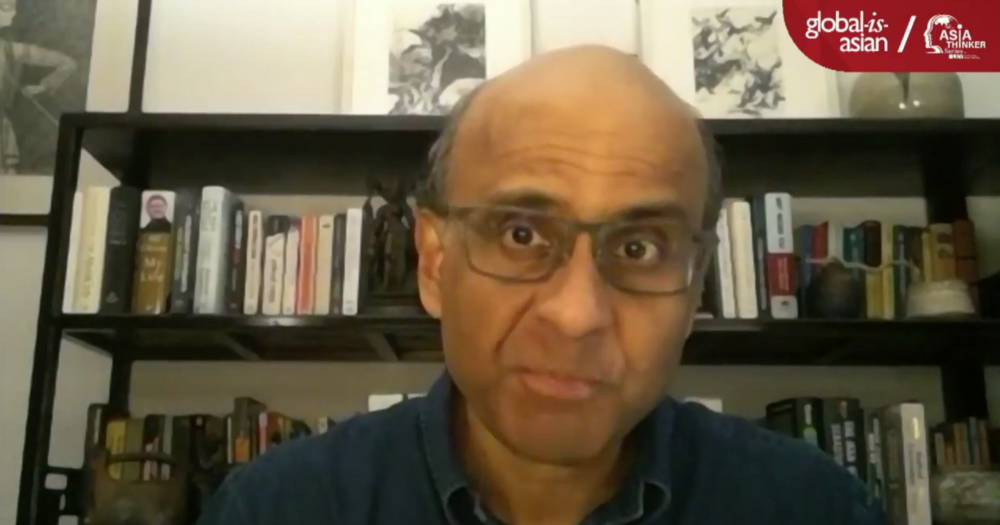In a virtual discussion organised by the Lee Kuan Yew School of Public Policy (LKYSPP) on July 22, Senior Minister Tharman Shanmugaratnam said there is going to be a demand for effective states that are able to achieve outcomes efficiently and in an inclusive fashion.
He was responding to a question from the moderator, James Crabtree, an Associate Professor in Practice from LKYSPP, about whether countries like Singapore with a tradition of "small government" will have difficulty managing the transition into "big government".
In Western political parlance, "small (or limited) government" usually means less direct government intervention in the economy, while "big government" has more direct intervention.
The Singapore economy has usually been ranked highly for its freedom, with the CATO institute ranking it second in the world, just behind Hong Kong. However, Singapore does have strong government involvement in public and social policy.
The talk titled "After the pandemic - the rebirth of big government? State capacity, trust and privacy in the post-Covid-19 era" was moderated by LKYSPP Associate Professor James Crabtree.
Tharman was joined by Bloomberg editor-in-chief John Micklethwait and Financial Times global business columnist Rana Foroohar.
Government with a spirit of activism
Tharman added that an effective and inclusive government requires a certain activism on their part. He said:
"I think we're not going back to large states per se, but we do have to go back to a system of having faith in activism on the part of government. On having a sense of moral purpose in government.
On having the confidence to convince a population that these are the right things to do and we're going to have to organise ourselves together to achieve it."
"You don't necessarily have to be very large, but you have to very good at the most important things we should be doing, and go about it with a spirit of an activist," added Tharman.
Tharman said that an important priority going forward is to "re-centre government and fiscal policy on the provision of public goods." Such public goods include education, skills accumulation through life, being able to match unemployed workers to new jobs, building liveable cities, as well as research and development, he elaborated.
"If you focus on public good, and you try and do it well, and you try to leverage on the energies of the private sector and our communities, you have an effective state. If you try to do too many things... it has not worked out well anywhere in the world," added Tharman.
Government should develop collective responsibility
Tharman also talked about the role of governments in developing "collective responsibility" in society.
Saying that there are lessons to be learnt from the Scandinavian economies regarding "collective responsibility", not just from Singapore, he said the people in those countries know they are "not just doing their part because the state is telling them to do so, but they feel they are contributing to society". He said:
"They feel that it is a society which is inclusive in the sense that 'I am contributing and everyone is contributing'... I think that's a truly progressive culture, rather than those that rest very largely on redistribution in the passive sense. It's got to be a far more active progressivism."
In response to a question about how this sort of culture could be forged, Tharman noted that in general, conservatives or those on the right believe that people who aren't doing well are not exercising enough responsibility for themselves, while liberals or those on the right believe the government isn't doing enough to help them.
He added that the politically left and right ways of looking at society are losing their appeal.
"Certainly, we haven't seen a sudden surge of irresponsibility on the part of people that can explain why wages have been stagnant for three decades... At the same time, the old system of redistribution hasn't worked out well. It doesn't give people a sense of true inclusiveness.
And I think the problem is that redistribution was too much about compensating the losers, and not enough about helping people to regrow, to helping to regenerate communities, towns, and individuals. And empowering people to come together to work with companies, to work with an educational institution, empowering networks of people."
He added that the social compact has to involve people playing an active role to improve themselves and take responsibility for their families.
"It's about taking collective responsibility and personal responsibility at the same time," said Tharman.
Focusing on the fundamentals
Tharman ended his talk on a hopeful note, saying that the crisis has made the role of essential jobs more recognised. He added that more broadly, the crisis is leading to "a refocusing on the fundamentals". He said:
"If we can strengthen our social compacts, whichever society we are in, we have a better future.
And sometimes you need a crisis to refocus on that fundamental. Social compacts make for a better future for everyone."
You can watch the entire panel discussion here at this link.
Top image from LKYSPP's Facebook page
If you like what you read, follow us on Facebook, Instagram, Twitter and Telegram to get the latest updates.
